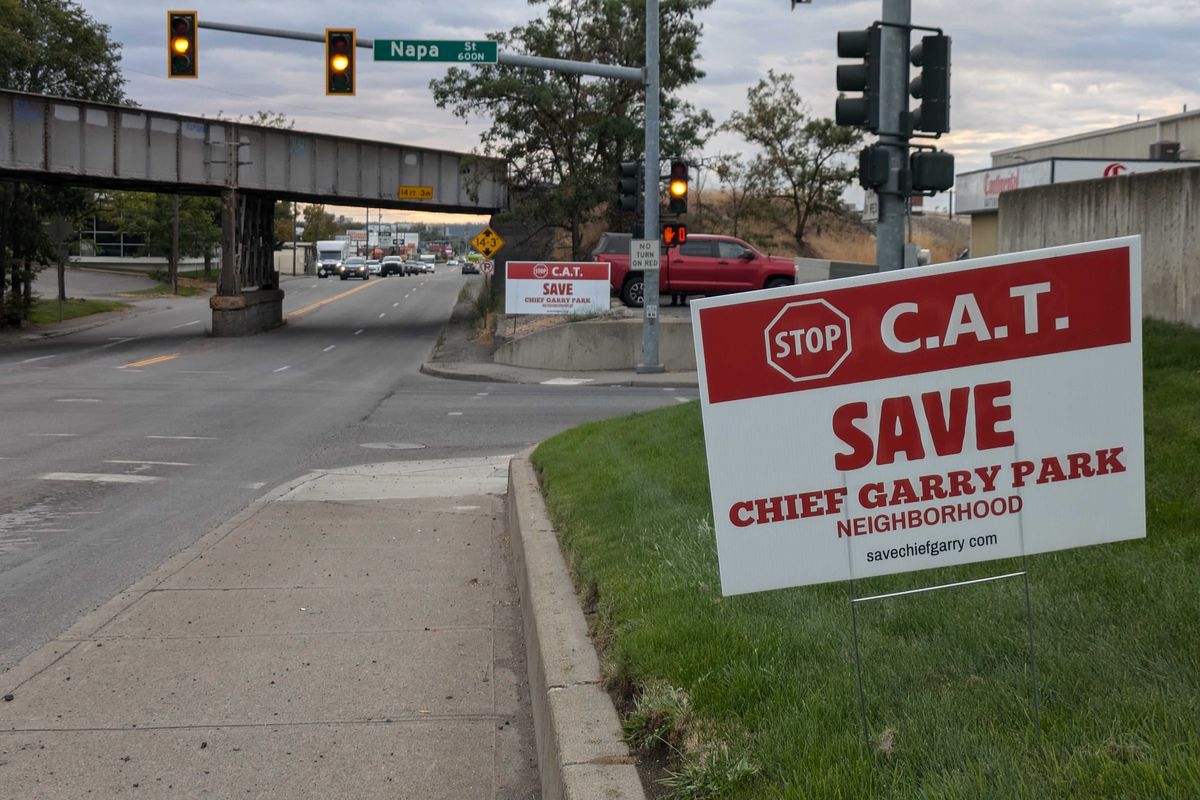Amid campaign of opposition, Spokane Mayor Lisa Brown backs down from treatment service in Chief Garry park

Spokane Mayor Lisa Brown has backed down from an effort started by her predecessor to disperse addiction treatment services from the city’s downtown core, after a concerted push by businesses to oppose the plan.
The administration had in recent months begun to move forward with plans to spend more than $1.8 million of its remaining COVID-19 relief funds to purchase a building in the Chief Garry Park Neighborhood where Compassionate Addiction Treatment could relocate out of its current location near the intersection of Second Avenue and Division Street, one of the most visible centers of the addiction and homelessness crises in the city.
Opposition to the move was swift, animated by many of the same business groups that had long lobbied for fewer addiction and homeless services to be located downtown and stood side by side with former Mayor Nadine Woodward in those efforts.
A Save Chief Garry Park Neighborhood organization was created of primarily politically active businesses, and more recently businesses in the affected area, paying for billboards railing against the move and attending recent school board meetings to voice opposition. On their website, they argued that the proposal put undue burden on a neighborhood that has already absorbed numerous service providers and featured photos of the homeless, trash and graffiti downtown.
Many of the same business interests rallied earlier this year against efforts to relocate and change the service model of the House of Charity, a homeless shelter operated by Catholic Charities that is located near Compassionate Addiction Treatment’s current site. Developer Larry Stone, a founder or key figure in many of the organizations fighting the relocation of Compassionate Addiction treatment, wrote a May letter to other politically active business owners that argued the city should stop investing in either organization.
“I fully support closing HOC and the blight it has cast on our beautiful downtown region,” he wrote. “Additionally, I oppose supporting and investing in Catholic Charities and CAT (Compassion Addiction Treatment) in the downtown area.”
In an email shortly after the bid to move Compassionate Addiction Treatment was halted, developer Sheldon Jackson wrote to an email server he maintains of hundreds of primarily business owners that he wasn’t satisfied by the decision.
“Now Downtown is stuck with the worst neighbor ever … if CAT is a nuisance property, they should be shut down immediately,” he wrote.
Councilman Paul Dillon believes the opposition is misinformed and said Thursday he was saddened and angered by the heated rhetoric about Compassionate Addiction Treatment.
“I felt like I was screaming into the void at times,” he said, referring to efforts to explain that the new facility would be a sobering center, not a homeless shelter.
“My understanding was that this new model was something they were wanting to do for quite some time, but there was this confusion of, ‘Oh, they’re just going to bring Second and Division with them to this neighborhood,’ but in reality the challenges of Second and Division were one of the reasons why they wanted to move,” Dillon said.
In a Thursday interview, Brown said she was still committed to decentralizing downtown service providers, but felt that it would not be fair to the organization or those they would serve to put them under the scrutiny of the “sometimes quite uninformed opposition.”
“We hear critics that don’t have anything positive to say about this administration; even if they were calling for the exact same thing six months ago, if I do it six months later, they’re not going to be happy,” she added. “But I think there are also a lot of good people in Spokane who want collaboration, who want success and want to give us the benefit of the doubt, and I am hopeful and optimistic that those voices will become a bit louder.”
Brown proposes shifting the $1.8 million in funds to support her efforts to also decentralize homeless shelter services away from the large congregant warehouse on Trent Avenue that has been the backbone of the city’s homeless services for nearly two years.
Those funds could be used to provide reliable funding for the “scatter site” model, which the Brown administration has argued is intended to be a pilot to encourage other jurisdictions to follow suit.
In a Thursday news release, Brown called on “those critics to come to the table and propose constructive solutions,” and on Spokane County to move forward with a partnership that brings the county’s behavioral health funds “to bear on these issues.”
Councilman Michael Cathcart, a critic of the proposal to open a sobering center in the Chief Garry Park neighborhood, believes it is disingenuous to say no one is bringing constructive feedback.
He has pushed for more community engagement in areas where “difficult-to-site” facilities are proposed and more guarantees by those service providers that they will be good neighbors.
An ordinance that would have required these steps to be taken for facilities like Compassionate Addiction Treatment has been deferred multiple times, and Cathcart believes it will continue to be delayed.
Cathcart said he’s not focused on the critics who are calling for these services to simply be removed from the city.
“None of these people we’re talking about sit in a position to divest or shut down any of these things,” Cathcart said. “They have a right to advocate, but the issue here is who is on council, and what are their views.”